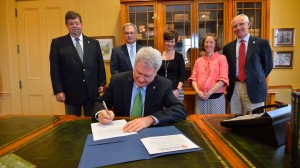OXFORD, Miss. – University of Mississippi leaders gathered recently to discuss an action plan to advance sustainable initiatives on campus, with the long-term goal of achieving climate neutrality.
The Feb. 24 gathering took place as part of the university’s first-ever meeting of the Broad Council for Sustainability, a group that will advise, adopt and begin implementing a climate action plan designed specifically for Ole Miss.
“Higher education institutions have a significant role here,” said Ian Banner, university architect and director of sustainability and facilities planning. “There are a lot of unknowns on the road to climate neutrality – it may even be our graduates who develop solutions to help us reach our goal. In the meantime, it’s our responsibility to begin this necessary journey. What we do here matters.”
The creation of the council is a result of the university’s participation in the American College and University Presidents’ Climate Commitment, or ACUPCC, which Chancellor Dan Jones signed in April 2014. UM is among 686 universities nationwide to make this commitment to climate neutrality.
During the meeting, Provost Morris Stocks acknowledged the university’s unique position when addressing climatic issues, not only because of the large-scale operations taking place on campus but also from a research and educational standpoint.
“As our chancellor says, our responsibility of transforming lives extends to helping our students be good stewards of our resources,” said Stocks, who welcomed the council on behalf of Jones. “When we integrate sustainability into our educational experience, we are achieving our mission of supporting students’ development of critical and creative-thinking abilities, their sense of global responsibility and promotion of lifelong learning.”
To achieve climate neutrality, the university must reach a point at which it has net zero greenhouse gas emissions. This goal is attainable by eliminating or reducing these emissions as much as possible and mitigating the remaining emissions, according to the APCUCC.
The university will begin its journey toward climate neutrality by gathering data through a greenhouse gas inventory and by assessing UM through the Association of Advancement of Sustainability in Higher Education’s Sustainability Tracking, Assessment and Rating System. UM groups will then move forward to develop and begin implementing the plan.
“Human influence and greenhouse gases are the dominant causes of the increase in global average temperature of the Earth,” said Mustafa Altinakar, director and research professor of the UM National Center for Computational Hydroscience and Engineering, who spoke at the meeting. “The impacts are observed in rising sea levels, precipitation patterns, hydrologic regimes, floods and droughts, and environmental processes. We must reduce our carbon footprint and take the necessary steps to reduce our vulnerability to future climate change impacts.”
